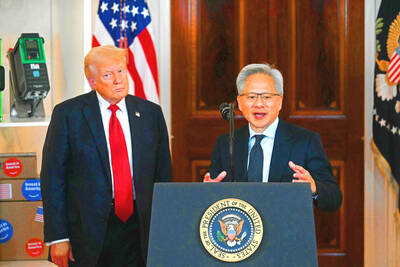Have you ever looked down at your clothes or skin and seen an insect like this? Most people think of these little bugs as signs of good luck. Their bright red color, black spots and shiny shells make them many people's favorite bug. In fact, in many parts of the world, people think it is bad luck to kill them.
In the US, this bug is called a ladybug. In the UK and some other English-speaking countries, it's called a ladybird. Scientists have their own name for it: lady beetle. Ladybugs actually are beetles, although many people think of beetles as black and little bit ugly.
The next time a ladybug lands on you, make a wish. Then carefully blow the ladybug away. Do you think your wish will come true?

PHOTO : AP
(Kayleen Hartman, Staff writer)
你可曾低頭看見衣服或皮膚上有過這樣的昆蟲?多數人認為這種小蟲象徵著好運氣,紅底黑點的閃亮外殼,讓牠成為許多人最喜愛的昆蟲。事實上,世上許多國家的人都認為撲殺瓢蟲會帶來厄運。
在美國,這種蟲叫做「ladybug」。在英國和部分其他英語系國家又叫「ladybird」,科學家也自己給牠取名字︰「lady beetle」。瓢蟲其實是甲蟲的一種,只不過許多人認為甲蟲又黑又醜。
下次有瓢蟲飛到你身上,許個願,然後小心吹走牠。你認為你的願望會實現嗎? (翻譯:鄭湘儀)

When Nvidia CEO Jensen Huang revealed on Friday last week that the company is working with the Trump administration on a new computer chip designed for sale to China, it marked the latest chapter in a long-running debate over how the US should compete with China’s technological ambitions. The reasoning has sometimes changed — with US officials citing national security, human rights or purely economic competition — but the tool has been the same: export controls, or the threat of them. Nvidia believes it can eventually reap US$50 billion from artificial intelligence (AI) chip sales in China. But it so far has

Long before numerals and arithmetic systems developed, humans relied on tally marks to count. These simple, repeated marks — often just straight lines — are one of the earliest and most widespread methods of recording numbers. Archaeological findings suggest that humans began tallying in prehistoric times. During the Late Stone Age in Africa, humans began to carve notches onto bones to create tangible records of quantities. One of the earliest known examples is the Wolf bone, an artifact unearthed in Central Europe in 1937. This bone bears notches believed to be an early form of counting. Even more intriguing

Continued from yesterday(延續自昨日) https://www.taipeitimes.com/News/lang In many Western countries, the most common form of tally marks employs a five-bar gate structure: four vertical lines followed by a diagonal slash. To form this group, one begins by drawing four parallel vertical lines, each representing one. For the fifth, draw a diagonal line across the existing four. This diagonal stroke effectively creates a distinct group of five. To continue counting, just initiate a new cycle in the same manner. A set of five tallies combined with a single vertical line next to it represents the number six. Across many Asian countries, the Chinese character

In 2024, multiple airplane accidents caused severe casualties, including a Jeju Air disaster at the year’s end. However, not all incidents ended in tragedy. Early in the year, a Japan Airlines flight caught fire after landing in Tokyo, but all 379 passengers and crew members escaped within 90 seconds. This event highlights the “golden 90 seconds” that experts emphasize — most survivors evacuate the plane within this critical window. Proper preparation ensures you can act quickly and decisively during these crucial moments when every second counts. Your survival strategy begins before takeoff. Wear long pants, a comfortable top, and